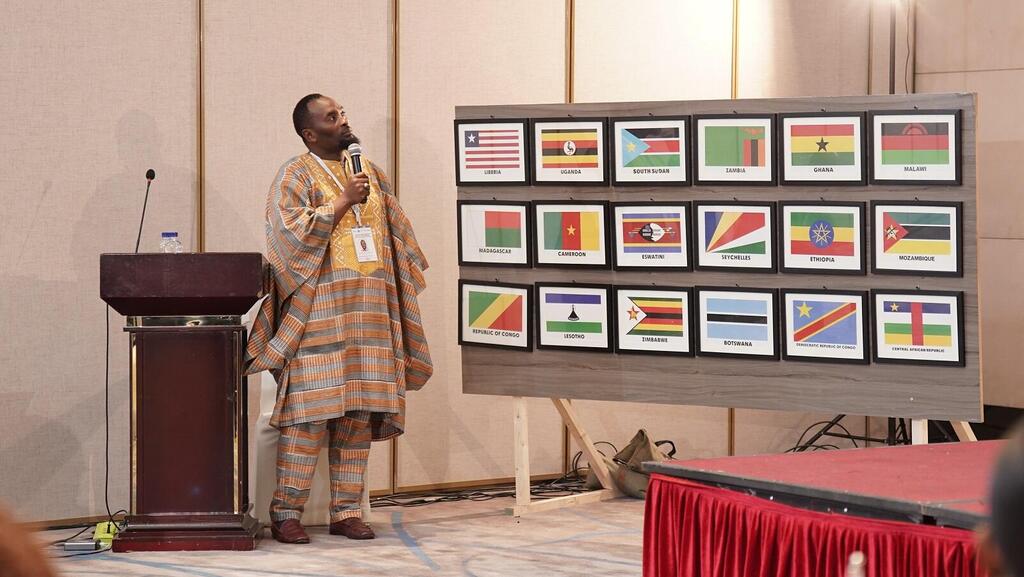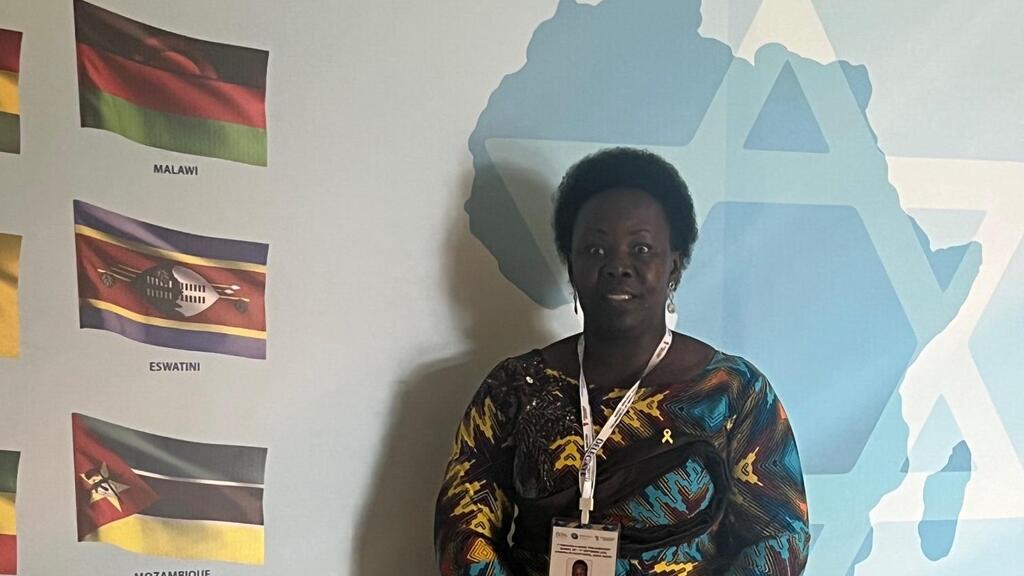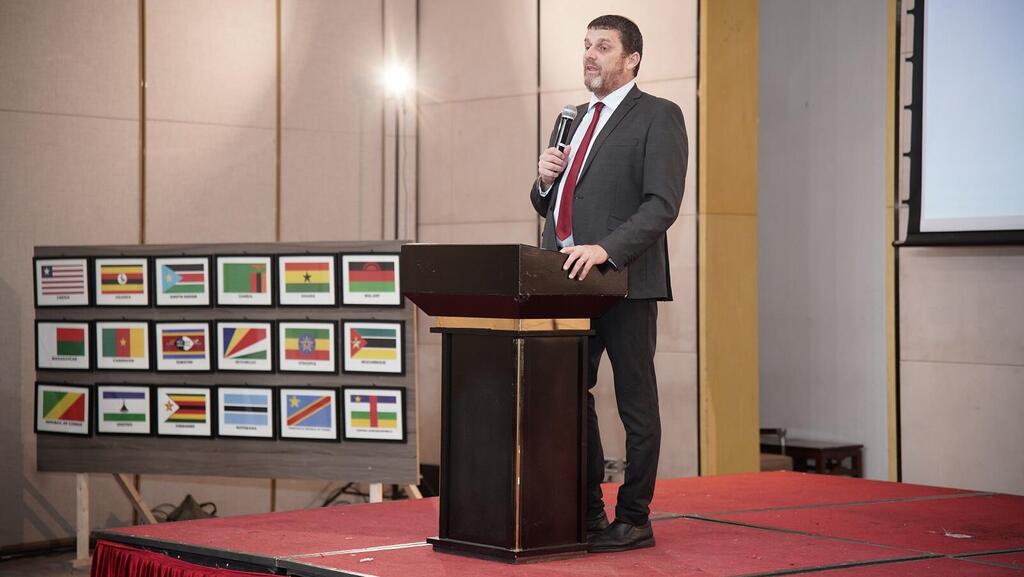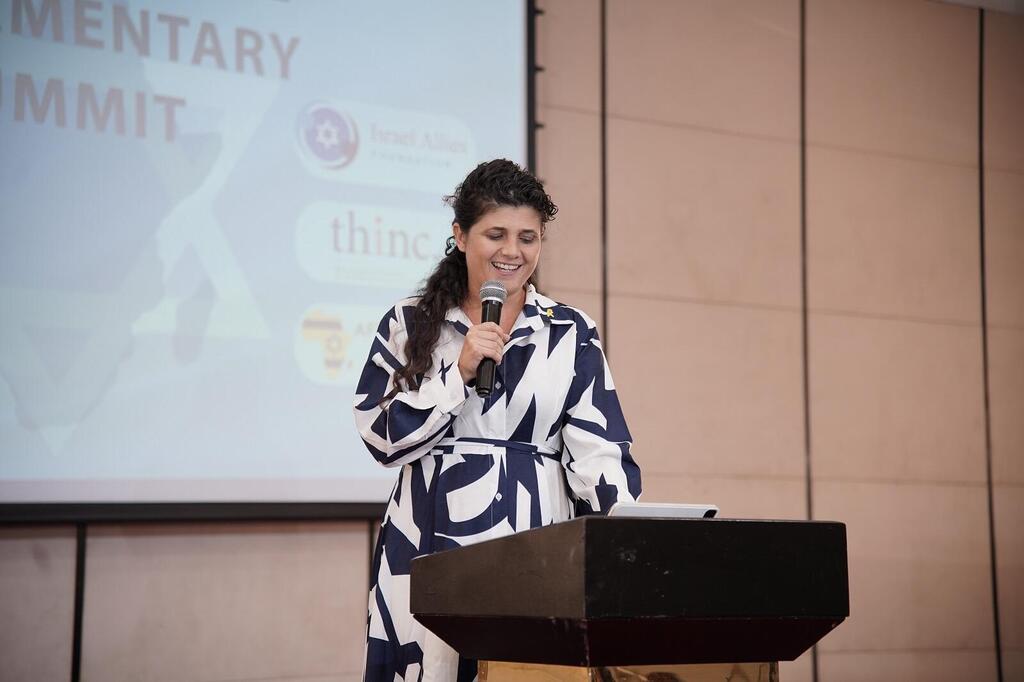Getting your Trinity Audio player ready...
More than 40 lawmakers from over 20 African countries signed a resolution on Wednesday affirming Israel's right to exist with Jerusalem as its capital. The resolution condemned legal efforts against Israel by the African Union and other entities, stating that these actions undermine negotiations and existing agreements, including the Oslo Accords.
The resolution declares, "We affirm Jerusalem as the legitimate, undivided, and eternal capital of the State of Israel." It also calls for respecting the historical, legal, cultural, and religious connections of the Jewish people to historic Palestine, including Jerusalem and “the Judea and Samaria ‘West Bank.’”
4 View gallery


Dennis Nthumbi, Africa director, Israel Allies Foundation
(Photo: Africa-Israel Parliamentary Summit)
The "Addis Ababa Declaration of Africa-Israel Cooperation and Partnership" was signed by lawmakers from countries including Botswana, Cameroon, the Central African Republic, the Republic of the Congo, the Democratic Republic of the Congo, Ethiopia, Ghana, Ivory Coast, Kenya, Madagascar, Nigeria, Rwanda, South Africa, South Sudan, Tanzania, Uganda, and Zambia during the first Africa-Israel Parliamentary Summit in Addis Ababa, which ran Sept. 10-11.
The resolution, directed at African heads of state, also condemned anti-Zionism as a form of antisemitism and denounced violence against Israel, naming Hamas and Iranian-backed groups. It supported multilateral peace efforts like the Abraham Accords and called for stronger diplomatic and economic ties between Africa and Israel. Additionally, it backed Israel's observer status in the African Union.
“We know who our friends are ... and they proudly stand with Israel,” said former deputy mayor of Jerusalem, Fleur Hassan-Nahoum.
The summit was organized by the Israel Allies Foundation, the Israel-Africa Initiative, and Thinc Israel. It emphasized the strategic partnership between Israel, the Jewish community, and African nations.
A key focus of the summit was enhancing economic collaboration between Africa and Israel.
With 70% of sub-Saharan Africa’s population under the age of 30, the continent has the world’s youngest population. Israel, known for its innovation as the “startup nation,” has the technology and expertise to help train this young workforce, paving the way for economic growth in Africa and potential labor benefits for Israel. Strengthening these economic ties could also enhance political relations, potentially boosting Israel’s support in international bodies like the United Nations and the International Criminal Court.
Israel maintains open diplomatic relations with 46 of Africa's 54 nations. However, most African countries typically do not vote in favor of Israel in international forums.
The Allies Caucuses, whose leaders attended the event, comprises pro-Israel, predominantly Christian lawmakers who support Israel in their respective parliaments, often driven by their Judeo-Christian religious beliefs.
“Israel has what you need to develop,” Erik Selle said. “You shouldn’t look to Europe. You shouldn’t look to America; you shouldn’t look to the past. You need to look to the future, and for Africa, Israel is the future.”
Queen of Sheba Accords
MK Sharren Haskel, co-chair of the Knesset’s Christian Allies Caucus, suggested expanding the Abraham Accords to Africa through a proposed initiative called the “Queen of Sheba Accords.”
“None of us have territorial claims of one another, which means these agreements are only for the sake of humans and their well-being, for our children’s prosperity,” Haskel told lawmakers. She explained that such a treaty would “bring us together again and strengthen our communities. That will protect us and our children from the danger that is coming.”
The proposed Queen of Sheba Accords would encompass economic cooperation, defense, security, intelligence sharing, and educational, religious, and cultural collaboration.
“Only with a strong alliance will we be able to defeat evil,” Haskel said. “We all understand the religious and cultural war we are facing against radical Islam, so we have to speak also about faith-based diplomacy. If we establish the Queen of Sheba Accords as the foundation for a joint security and defense alliance, we will be able to defeat radical Islam much quicker and with fewer casualties.”
However, most lawmakers focused less on specific accords and more on the broader reasons for collaboration between Africa and Israel. These reasons included geography, collective memory, hope, history, and faith, as highlighted in speeches by African Union Chaplain Fr. Dr. Louison Emerick Bissila and MK Amit Halevi.
The first reason was geopolitics.
“In today’s world, where multilateralism is considered crucial, sovereign nations, whether individually or as part of groups, seek the freedom to collaborate with any nation of their choosing, without being subjected to the impositions of former colonial powers,” Bissila said.
He explained that Africa now embraces win-win partnerships with global powers such as China, Japan, Russia, India, and Brazil.
“Therefore, it is paradoxical that working with Israel should be seen as taboo, especially at a time when multilateralism is valued,” he said. “Intellectual hypocrisy should be discarded, and it should be acknowledged that African nations are free to collaborate with Israel. Furthermore, international organizations to which African states belong should respect the choice of the people.”
According to Bissila, Africa’s tendency to forget its past was the second reason.
“Africans have a tendency to forget, thereby elevating those who have caused us suffering and disregarding those who have our best interests at heart,” Bissila said.
He stressed the importance of Africa, remembering its identity and history, which are linked to Israel through the Bible.
Finally, Bissila emphasized that Africa could learn a valuable lesson in hope from Israel.
“Pope Francis refers to Africa as ‘the continent of hope,’ and Israel’s national anthem, ‘Hatikvah,’ means ‘the hope,’” the chaplain noted. “It symbolizes the unwavering hope of a people who have preserved their aspirations of returning to their ancestral land throughout the centuries.”
“Today, we witness that with Hashem, everything is possible,” the chaplain said, using a Hebrew term for God.
“The strength of Israel lies in the land of Israel. … What we now know as the State of Israel is, in essence, the fulfillment of God’s promise to settle His people in their land.”
Later, Halevi added history as another reason for collaboration, emphasizing that Israel and most African nations, except Ethiopia, share a significant experience: liberation from colonialism.
4 View gallery


Ugandan parliamentarian Hon. Achan Judith Peace
(Photo: Africa-Israel Parliamentary Summit)
“By colonialism, I mean not only the 19th-century period when Africa was divided and controlled by European powers, but also the colonialism of ancient and medieval times—from the Greeks, Romans, Byzantines, and Arabs,” Halevi said. “We, the Jewish people, too, freed ourselves from colonialism. Like Africa, Israel was also conquered and subjugated by Greeks, Romans, Byzantines, Arabs, and Turks. And we, too, lived under British colonial rule in the 20th century.”
He stressed that experiencing subjugation “is not a minor detail in a nation’s history” and that those who have lived under oppression understand the true value of freedom.
“Nations whose natural resources were exploited by foreign rulers develop a deep bond with their land and its landscape, deepening their roots there,” Halevi explained.
Finally, he highlighted faith, noting that freedom and redemption are central to biblical theology, which calls for brotherhood, unity, and cooperation.
‘It is strategic’
Uganda and Israel share a spiritual bond, according to Hon. Achan Judith Peace, a Ugandan member of parliament who attended the event. However, their relationship is also convenient. For years, Uganda has learned from Israel’s expertise in agriculture, defense, and technology, Peace said.
“It is strategic for Uganda to relate to Israel,” Peace told The Media Line.
She also emphasized the importance of this relationship in combating extremism. Peace explained that extremist Muslim groups are actively recruiting Christians in Africa, often using financial incentives. She attended the parliamentary event to gather information that could help Uganda in this fight and support the country’s pursuit of justice.
According to Peace, the International Criminal Court has unjustly ruled against Israel, and she hopes the knowledge gained at the summit will help Uganda advocate for fair treatment of Israel in the international arena.
“We know that you all face anti-Israel voices in your parliaments, and your choice to stand for truth and justice is not an easy task,” Haskel said.
She called on the room of pro-Israel lawmakers to join forces against radicalism.
“If we want to defeat the radical Islamist front of political influence, then let’s join forces ... and create ... an economic alliance that will create resilience against the enormous amount of money and influence Iran is buying,” Haskel said. “We need to create a framework together that will create awareness and information, but most of all, will be a declaration to the radicals that our friendship ties and bonds are strong like irons, and our guards will not fall down.
“We read the warnings from the Bible, and we will take the strength that God has put in our hands,” Haskel concluded. “We will work to defeat evil together.”



